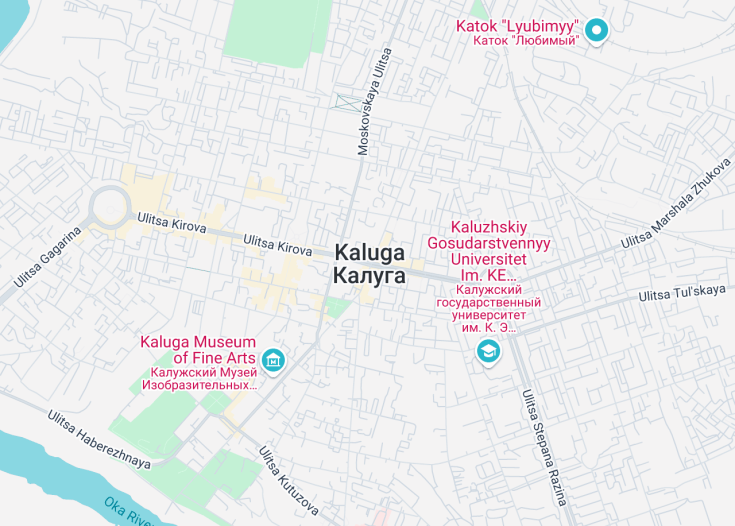Kaluga, a historic city in Western Russia, is renowned for its rich cultural heritage and pivotal role in the space industry. Established in the 14th century along the banks of the Oka River, it offers an enchanting array of architectural marvels, from ancient churches to grand estates, alongside museums dedicated to its aerospace achievements.
The city’s tranquil parks and picturesque river promenades provide a peaceful retreat from the bustling urban areas. Kaluga’s blend of historical significance and contemporary developments makes it a fascinating destination for both history enthusiasts and modern explorers.
Discover Kaluga’s hidden gems by visiting the Tsiolkovsky State Museum of the History of Cosmonautics, where Russia’s journey to the stars comes to life.
For a tranquil experience, stroll along the Oka River embankment at sunset to catch the breathtaking views alongside the city’s historic backdrop.
Top things to do & see in Kaluga
Select the following sights and activities to discover best tickets and tours available in Kaluga.
Kaluga: A Gateway to Russian Heritage
| Country | Russia |
| Time in Kaluga | GMT+3 |
| Language spoken | Russian |
| Population | 324,000 (source: latest census data) |
| Currency | Russian Ruble (₽, RUB) |
| Airports |
|
Kaluga, a charming city located in the western part of Russia, about 150 kilometers southwest of Moscow, is steeped in history and culture. Known for its major role during various periods in Russian history, particularly during the Napoleonic Wars, Kaluga’s heritage resonates through its well-preserved historical architecture and museums.
The city serves as a hub of innovation and science, celebrating the achievements of famed scientist Konstantin Tsiolkovsky, a pioneer of astronautic theory.
Where is Kaluga?
Kaluga is situated along the banks of the Oka River in the Central Federal District of Russia.
Distances:
| Route | Distance by car | Time by car |
|---|---|---|
| Moscow to Kaluga | 111 mi (180 km) | 2 hours 20 minutes |
| Tula to Kaluga | 77 mi (124 km) | 1 hour 50 minutes |
| Bryansk to Kaluga | 141 mi (228 km) | 3 hours |
What is Kaluga famous for?
Kaluga is particularly famous for its contributions to the space industry, being home to museums dedicated to the space exploration science based on Tsiolkovsky’s theories. Its historical town center is a cascade of cultural richness and Russian architecture.
History
Before 1700s: Early Foundations
The region of Kaluga, now a prominent city in Russia, saw its initial inhabitation by Slavic tribes. The foundation of Kaluga itself traces back to the middle of the 14th century, roughly established in 1371. It served mainly as a fortified frontier post on the borders of the Principality of Moscow. The strategic placement of Kaluga along the Oka River significantly contributed to its development as a trading center in medieval Russia.
1700s – 1800s: Industrial and Cultural Development
During the 18th and 19th centuries, Kaluga became a significant node for both industry and culture. The establishment of several manufacturing facilities, especially for textiles, marked the beginning of industrial growth. This era also witnessed the emergence of cultural luminaries like Konstantin Tsiolkovsky, a pioneer of astronautic theory, whose work laid the foundations for modern rocketry and space exploration. His presence and legacies contributed markedly to the intellectual and cultural richness of Kaluga.
1900s: Soviet Era and Modernizations
With the onset of the Soviet rule in the 20th century, Kaluga underwent substantial industrial expansion. The city saw the development of automotive and food processing industries, significantly boosting the local economy. Post World War II era was particularly pivotal, as Kaluga embarked on extensive urban planning and modernization efforts, reshaping its infrastructure and enhancing its industrial base.
2000s – Present: Technology and Development
In recent decades, Kaluga has focused on diversifying its industrial sector, welcoming numerous technological and manufacturing enterprises. This includes the establishment of a special economic zone aimed at attracting investment in technology and innovation. Today, Kaluga stands as a testament to continuous growth, blending its historical heritage with modern advancements.
Visit Kaluga
What to see and do in Kaluga, Russia
Kaluga offers an array of attractions and activities for visitors. Key highlights include:
- The Tsiolkovsky State Museum of the History of Cosmonautics, where you can delve into the history of space exploration.
- The Kaluga Regional Art Museum, showcasing Russian art from various periods.
- Exploring the old merchant quarters for a glimpse into Kaluga’s historical architecture.
- A leisurely walk along the banks of the Oka River, offering scenic views and tranquil spots.
- Visiting the myriad of parks and green spaces that dot the city, providing excellent leisure and picnic spots.
Notable Events in Kaluga
Kaluga hosts several events throughout the year, enhancing its cultural landscape. Noteworthy among them are:
- The “Cosmonautics Day” celebrated every April 12th, commemorating the achievements of the space industry.
- The Kaluga Jazz Festival, typically held in summer, attracts jazz lovers from across the region.
Best time to visit Kaluga
The optimal time to visit Kaluga is during late spring (May to June) or early autumn (September to October). During these months, the weather is generally mild and pleasant, perfect for exploring the city’s rich historical sites and participating in outdoor activities.
Is Kaluga worth visiting?
Kaluga presents a compelling blend of history, culture, and modernity, making it a worthwhile destination for travelers. Its rich historical tapestry and association with the space industry provide unique educational experiences that are hard to find elsewhere.
However, tourists should be aware of the relatively quieter nature of the city compared to other tourist hotspots in Russia, which might not appeal to everyone’s tastes. Despite this, its cultural festivals and serene environment offer a refreshing escape from the bustling city life. Visiting Kaluga can be particularly rewarding for those interested in Russian history and space exploration.










